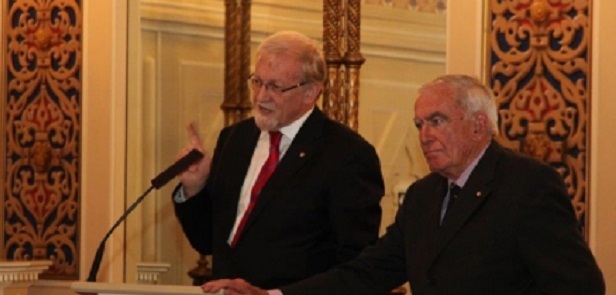Responding to Mass Atrocity Crimes: from Libya and Syria to Iraq

Professor the Hon Gareth Evans tests the approach of good international citizenship in foreign policy decision-making in response to mass atrocity crimes.
The particular context in which I want to test the approach of good international citizenship is that of the proper international response to mass atrocity crimes – genocide, ethnic cleansing, other crimes against humanity and major war crimes – an issue around which policymakers have long been struggling, and are still struggling today, particularly in Syria and Iraq.
Both President Obama and Prime Minister Abbott, in justifying the decision to use military force against the marauding genocidal forces of Da’esh (or ISIL, ISIS or IS), have overwhelmingly invoked the terrorist threat posed by them, in the region but also very much in the West, for the obvious reason that this can be linked to very traditional national security interests. This is even though it has long been obvious that the ‘war on terror’ cannot be won from the air backed by only limited ground support – and that successfully meeting terrorist threats depends ultimately on a rather different set of responses: international cooperation in intelligence and policing, and winning, not alienating, relevant community support.
The much more credible rationale for military action, because it has a finite rationale, narrower operational objectives, and a much better chance of winning and retaining support in the relevant communities, is simply acting to protect – if they manifestly can’t be protected any other way – people at risk of genocide or other mass atrocity crimes. This humanitarian objective was articulated, in these terms, by Obama, Abbott and others when military action was first mobilized to protect the Yazidi people fleeing from Da’esh in August, but it has since dropped out of sight. And that, I suspect, is because political leaders have enormous difficulty in casting these enterprises in the kind of traditional national interest terms they think they need to: “[o]ur values are not our interests” as Senator John McCain keeps saying, and too many people, including the present Australian government, seem to believe him.
If we can only get it into our policymakers heads, and get them to argue persuasively to their publics, that our values are our interests, in the way that I have tried to express, I continue to believe that not only mass atrocity crime cases, but many other kinds of global good cause, would be much more systematically and effectively addressed.
There is of course another logical step in the argument that has to be filled in if responding effectively to mass atrocity crimes – including in extreme cases through the use of coercive military force – is in fact to count as an exercise in good international citizenship, and to generate reputational and reciprocity returns of the kind I have described. And that is to establish that preventing and responding to such crimes is an international obligation. If they are really none of the rest of the world’s business, especially when committed behind sovereign state borders, there won’t be much practical return for doing the right moral thing in trying to halt or avert them. The extraordinary thing is that, until very recently, not much more than a decade ago, the prevailing majority view was that sovereignty trumped morality, and that these crimes were none of the world’s business.
The good news is that there has been a fundamental change in the global normative environment over the last decade with the emergence of the ‘responsibility to protect’ (‘R2P’) norm. The not quite so good news is that after the apparent triumph of its application in Libya in 2011 – with unanimous resolutions by the Security Council invoking the concept – R2P has been going through something of a mid-life crisis, with paralysis over its application in Syria, and not much more agreement as to how it should be applied in Iraq.
The best demonstration to date of R2P at work in precisely the way intended (at least so far as its reactive dimension was concerned) has undoubtedly been the UN Security Council’s Resolution 1973 of 17 March 2011 on Libya, specifically invoking R2P, which, by majority vote with no veto or other dissenting voices, explicitly authorised ‘all necessary measures’, that is military intervention by member states, ‘to protect civilians and civilian populated areas under threat of attack’. Acting under this authorisation, NATO-led forces took immediate action, and the massacre of tens of thousands of civilians feared imminent in Benghazi did not eventuate. If the Security Council had acted equally decisively and robustly in the 1990s, the 8000 murdered in Srebrenica and 800 000 in Rwanda might still be alive today.
The unhappy reality since mid-2011, however, is that this Security Council consensus has not been sustained. As subsequent weeks and months wore on, the Western-led coercive military intervention – which concluded finally only with the capture of Gaddafi and the comprehensive defeat of his forces in October 2011 – came under fierce attack by the ‘BRICS’ countries (Brazil, Russia, India, China and South Africa) for exceeding its narrow civilian protection mandate, and being content with nothing less than regime change, a criticism which had considerable justification. The US, UK and France (P3) could have made something of the argument that the mandated civilian protection could, in practice, only have been achieved by completely ousting the regime, but made no serious attempt to persuade their Council colleagues at any stage – reigniting the old charge that if ever the P3 was given an inch it would take a mile.
This continuing dispute and all the distrust it engendered had, unfortunately, a major impact on the Security Council’s response to Syria, where the one-sided violence by the regime was by mid-2011 manifestly worse even than that which had triggered the Libyan intervention. In the face of vetoes from Russia and China, and continuing unhappiness by the other BRICS members, the Council found itself for many months unable to agree even on a formal condemnatory statement, let alone more robust measures like sanctions, an arms embargo, or the threat of International Criminal Court prosecution. And, save for a humanitarian access resolution negotiated largely by Australia earlier this year, that paralysis very largely continues to this day in Syria, and has been repeated – at least so far as Security Council resolutions are concerned, in Iraq.
But just as any celebration about the triumph of the R2P principle would have been premature after the Libyan resolutions in early 2011, so too it would be despair now about its future. There are many reasons for believing that the whole R2P project, with all its implications for the status of state sovereignty, has not been irreversibly tarnished, and that, even for the hardest cases, Security Council consensus in the future is not unimaginable.
The Hon Gareth Evans AC QC FASSA FAIIA is a former Foreign Minister of Australia and Labor MP.
This is the second in a series of three articles publishing an edited version of the address by Professor the Hon Gareth Evans AC QC FASSA FAIIA at the inaugural Government House Lecture and Reception, Tasmania Branch, Government House, Hobart, 7 November 2014.
Click here to read the first article in the series. A copy of the full speech is available here.





